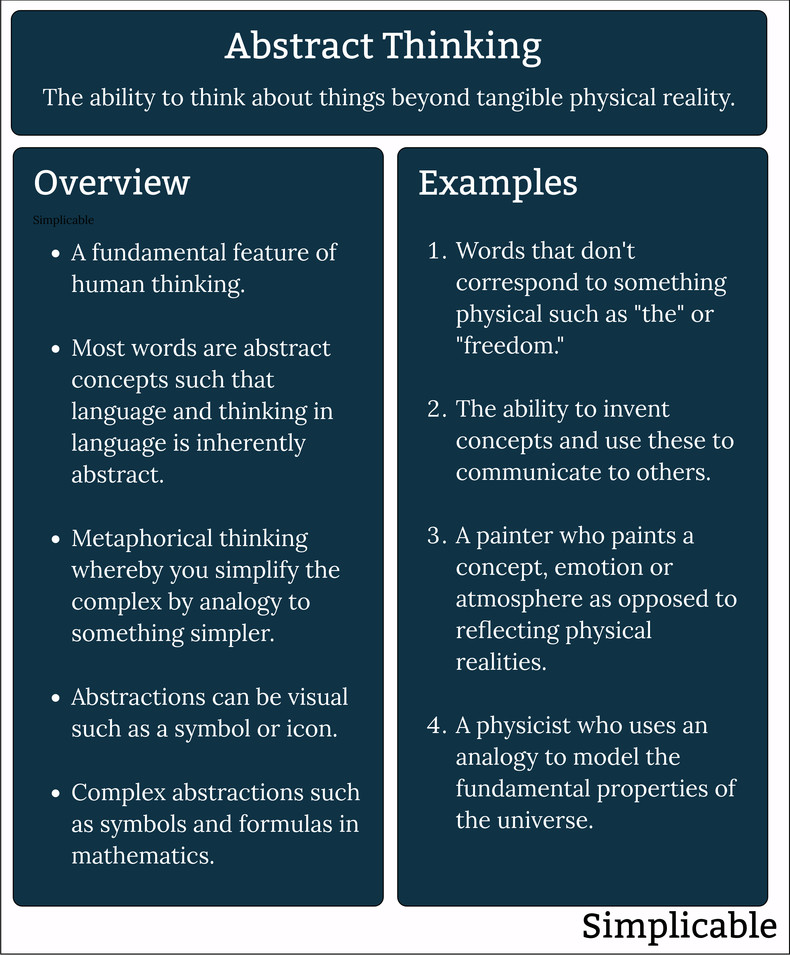
Concepts
All concepts that don't have a physical form are abstract. For example, thinking about freedom and respect is abstract thinking because these are ideas don't exist as a physical thing.Theories
Developing theories to explain observations. For example, a farmer who develops a theory that artichokes aren't growing well in a particular field because the soil is too acidic. This may be based on concrete data but the theory itself is conjecture and can therefore be considered abstract.Organization
Organizing things into abstract categories. For example, the cultural convention of organizing days into weekdays and weekends. These are both abstract concepts that can't be tied back to anything physical.Divergent Thinking
Divergent thinking is the process of using the imagination to create novel solutions to problems such as a farmer who identifies a companion planting that allows artichokes to thrive in acidic soil.Thought Experiment
Developing an analogy that simplifies a complex problem. For example, Galileo's Ship is a thought experiment that says that if you drop a cannon ball from the mast of a moving ship, it should fall directly below where it was dropped and that this location is not influenced by the speed or direction of the ship. This was developed by Galileo Galilei in 1632 to counter the prevailing argument at the time that if the Earth where really rotating an object dropped from a high location would not fall directly beneath where it was dropped because the Earth would have moved. It is now known that the Earth does rotate and that the principle of relativity validates the predictions of the Galileo's Ship thought experiment.Emotions
Emotions are mental states that color all thinking. The ability to think about the emotional impact of things is a type of abstract thinking. For example, a public speaker who is able to craft and deliver a message that builds feelings of trust, anticipation, joy and astonishment in an audience.Storytelling
Storytelling is the art of making information interesting. This typically wraps concrete information in elements such as literary devices, rhetorical devices, suspense, humor and culture that are almost always abstractions.Culture
Elements of culture such as norms are often social constructs that are completely abstract. It is a mistake to think that because something is abstract that it isn't real. For example, norms can help people to get along as a society and can be both real and valuable.Counterfactual Thinking
Counterfactual thinking is the process of imagining how that past could have been different. For example, if you say something dumb in a social situation you might later imagine more intelligent things you might have said and how this would have lead to different outcomes. Counterfactual thinking can be a waste of time as the past can't be changed. However, it can also provide insights and identify improvements that can be applied to the future.Prediction
Developing forecasts, estimates and predictions of the future is an abstraction because the future itself doesn't physically exist yet. For example, a hiker who runs into a wild boar on a trail who predicts what might happen if they quietly and slowly walk backwards away from the animal.Synthesis
Designing things is a process of abstract thinking. For example, a fashion designer who creates a hat from an idea. This is an example of an abstract concept becoming a concrete object.Aesthetics
Being able to understand why things are visually appealing or unappealing. For example, a hair stylist who is able to develop new styles that fit into a time, place and culture as visually appealing.Magical Thinking
Abstract thinking is a powerful form of thought that allows you to create value, solve problems and influence people. However, it can also be used for lazy thought processes, motivated thinking and to form biases that paint an inaccurate picture of the world. For example, magical thinking is the process of assigning magical powers to an abstract concept such as a technology that are unrealistic.Overthinking
In some cases, individuals spend too much time thinking about abstractions that are far detached from the practical realities of a situation such that they miss opportunities to make a quick decisions that would benefit them. For example, a student who spends endless hours thinking about their fear of public speaking as opposed to taking practical steps towards gaining speaking experiences that begin to defeat this fear.Summary
Abstract thinking is the ability to think about things that do not have some specific physical manifestation. Human language and visual symbols are inherently abstract such that abstract thinking is the rule and not the exception.
| Overview: Abstract Thinking | ||
Type | ||
Definition | Thinking that extends beyond concrete realities. | |
Related Concepts | ||
































